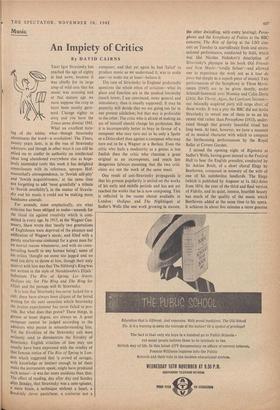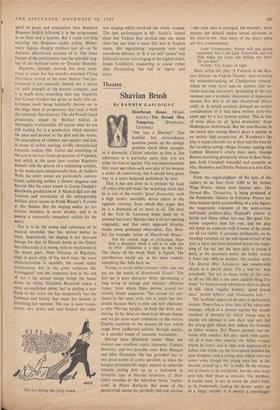Music
An Impiety of Critics
By DAVID CAIRNS THAT Igor Stravinsky has reached the age of eighty is bad news, because it was chiefly for its large crop of wild oats that his music was amusing and at that mature age we must suppose the crop to have been mostly garn- ered. Change eighty to sixty and you have the Times anno domini 1941. What an excellent turn- ing of the tables, what—though Stravinsky abominates the word—a revolution! The Times, twenty years later, is in the van of Stravinsky admirers; and though in other ways it can still be relied on to confer its authority on intellectual ideas long abandoned everywhere else as hope- lessly outmoded (only this week it has delighted connoisseurs with its reference, apropos Hof- mannsthal's correspondence, to `Jewish self-pity' and 'Jewish acquisitiveness,' at the same time not forgetting to add 'most gratefully' a tribute to 'Jewish sensibility'), in the matter of Stravin- sky and his music it could not be making more handsome amends.
For amends, most emphatically, are what criticism has been obliged to make—amends for the ritual sin against creativity which is com- mitted in every age. In 1913, at the Wagner Cen- tenary, Shaw wrote that `nearly two generations of Englishmen were deprived of the pleasure and edification of Wagner's music, and filled with a purely. mischievous contempt for a great man for no mortal reason whatsoever, and with no coun- tervailing benefit to any human being'; some of his critics 'thought no stone too jagged and no mud too dirty to throw at him, though their only quarrel with him was that The Niblung's Ring'was not written in the style of Mendelssohn's Elijah.' Substitute The Rite of Spring, Les Noces, Oedipus etc. for The Ring and The Ring for Elijah and the passage will fit Stravinsky.
It is true that Stravinsky has never lacked for a colt; there have always been cliques of the bored waiting for the next sensation which Stravinsky the tireless experimenter has never failed to pro- vide. But what does that prove? These things, in greater or lesser degree, are always so. A great composer cannot be judged according to the admirers who persist in misunderstanding him. Yet the frivolities of the Stravinsky cult were seriously used to demonstrate the frivolity of Stravinsky. English criticism of him may not usually have been expressed with the crudity of that famous notice of The Rite of Spring in Lon- don which suggested that 'a crowd of savages, with knowledge or instinct enough to let them make the instruments speak, might have produced such noises'—it was far more insidious than that. The effect of reading, day after day and Sunday after Sunday, that Stravinsky was a note-spinner, a mere brain, a technique without a heart, a fiendishly clever pasticheur, a couturier not a composer, and that yet again he had 'failed' to produce music as we understand it, was to make one—to make me at least—believe it.
The case of Stravinsky in England profoundly questions the whole ethos of criticism--what its place and function are in the musical hierarchy (much lower, I am convinced, more general and stimulatory, than is usually supposed). It may be posterity will decide that we are going too far in our present adulation; but that way is preferable to the other. The critic who is afraid of making an ass of himself should change his profession. But it is incomparably better to bray in favour of a composer who may turn out to be only a Spohr or a Dittersdorf than against a composer who may turn out to be a Wagner or a Berlioz. Even the critic who hails a mediocrity as a genius is less foolish than the critic who chastises a great original as an incompetent, and much less dangerous (always assuming that the two criti- cisms are not the work of the same man).
One result of anti-Stravinsky propaganda is that his present popularity is settled on the works of his early and middle periods and has not yet reached the works that he is now composing. This is reflected in the recent choice available in London: Oedipus and The Nightingale at Sadler's Wells (the one work growing in stature, the other dwindling, with every hearing); Perse- phone and the Symphony of Psalms at the BBC concerts; The Rite of Spring at the LSO con- cert on Tuesday (a marvellously fresh and unsen- sational performance, conducted by Solti, which was like Nicolas Nabokov's description of Stravinsky's physique in his book Old Friends and New Music—`totally fatless'—and allowed one to experience the work not as a tour de force but simply as a superb piece of music). Two performances of the Symphony in Three Move- ments (1945) are to be given shortly, under Schmidt-Isserstedt next Monday and Colin Davis (24th). But Threni, Agon, the Canticum Sacrum— our belatedly acquired piety still stops short of these works. It was a pity the BBC did not invite Stravinsky to reveal one of them to us on his recent visit rather than Persephone (1933), under- rated though that gravely beautiful ritual has long been. At least, however, we have a measure of its musical character with which to compare the forthcoming performances by the Royal Ballet at Covent Garden.
I missed the opening night of Rigoletto at Sadler's Wells, having gone instead to the Festival Hall to hear the English premiere, conducted by Sir Adrian Boult, of a short choral Elegy by Beethoven, composed in memory of the wife of one of his numberless landlords. The Elegy (which is published by Augener at Is. 6d.) dates from 1814, the year of the third and final version of Fidelio, and its quiet, intense, heartfelt beauty has much of the quality of the music which Beethoven added at the same time to his opera. It achieves in about five minutes a more genuine spirit of peace and consolation than Brahms's Requiem (which followed it in the programme) in an hour and a quarter. But I could not help enjoying the Requiem—pedal points, Bieder- meier fugues, doughy rhythms and all—in Sir Adrian's affectionate account of it. The finest feature of the performance was the splendid sing- ing of the baritone solos by Thomas Hemsley.
Rigoletto, strongly revived, has done some- thing to atone for last month's wretched Flying Dutchman revival at the same theatre. The per- formance is not especially refined, but it shows the solid strength of the present company, and it is much more rewarding than any Rigoletto that Covent Garden has given us lately (the un- fortunate work being habitually thrown on to the stage there in productions that treat it with the contempt they deserve). The old Powell Lloyd production, staged by Michael Geliot, is thoroughly workmanlike. Of course what we are still waiting for is a production which matches the pace and passion in the plot and the music, the atmosphere of violence and squalor and lust, in terms of swiftly moving, vividly characterised romantic realism (Mr. Geliot did something of the sort in his very lively production of Volpone), and which at the same time touches Rigoletto himself with the gleams of a redeeming nobility, as the music most unequivocally does. At Sadler's Wells the court scenes are particularly conven- tional, achieving neither a formal elegance and flourish like the court scenes in Goran Gentele's Stockholm production of A Masked Ball nor the freedom and conviction of the unforgettably brilliant party scenes in Frank Hauser's Traviata at this theatre. But the staging makes no im- portant blunders, is never shoddy, and is in general a reasonably competent vehicle for the music.
For it is by the sweep and coherence of its musical ensemble that this revival makes its Mark. Individually the singing is not first-rate (except for that of Donald Smith as the Duke), but collectively it is strong, with no weaknesses in the minor parts. Peter Glossop, as Rigoletto, sings in great slabs of big, hard tone; the vocal characterisation is unsubtle, the sound rather monotonous, but in the great outbursts like 'Corteggiani' and the vengeance duet at the end of Act 3 his animal energy brings the house down. As Gilda, Elizabeth Harwood makes a most accomplished debut, but in putting a new finish to her voice she has temporarily lost the freshness and beauty that made her Semele so Promising last summer. The one is mere vocali- sation, very pretty and very limited, the other 'I'm not taking this lying down. . . was singing which involved the whole woman. The best performance is Mr. Smith's; indeed since Jon Vickers first strolled into our midst there has not been a tenor like him in English opera. His ingratiating, supremely easy and melodious delivery of `E it sol dell' anima' was Italianate tnezza voce singing of the highest order. James Lockhart's conducting is sound rather than illuminating, but full of vigour and sense.











































 Previous page
Previous page